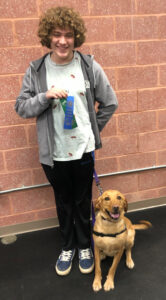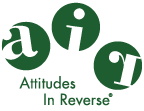Importance of Training your Dog
By Katelyn Baker, AIR® Co-Founder
January is National Train Your Dog Month. As we close out the month, Katelyn Baker shares some thoughts on the importance of training, and building a relationship with your dog. Consistent, positive training from the start will significantly benefit you and your dog...and will start you on a path to having a future therapy dog!
Most of you who are here KNOW training is important, but you might not know WHY. Let's look at some of the reasons training, and more importantly POSITIVE reinforcement, is so important for us AND OUR DOGS.
We use the term "training" to refer to a period of time in our dog's lives when we want them to learn specific things from us. This might include learning how to "sit" on cue, not jump up when people come over, and how to not pull us while we are walking with them. However, we have to keep in mind our dogs (as well as ourselves!) are always learning. When our dogs are younger, they obviously have more to learn, but we must keep in mind that there is no time "training" begins or ends.
When we talk about "training", we are talking about teaching them habits, rules, and boundaries that we want our dogs to understand in order to make our lives, and by extension the lives of our dogs, easier. When our dogs are "well behaved", they are able to do more things like stay out of the kitchen when we are eating, go on leisurely walks with us and more! It is our responsibility to teach our dogs what these rules and expectations we and the human world have for them. Most of the time, we think about how our dog has to adjust to our rules, without taking into account that WE are the ones that have put them in that situation. Our dogs didn't ask to be whisked away to live in our world of fancy couches, cushy beds, and food hand-delivered twice a day.
While there are certainly benefits to this (I would love to be fed cheese for all the things I have done right throughout the day!), there are also things our dogs must give up in this deal. Walking at their natural pace, eating whatever and whenever they want, hunting and sniffing at their leisure-all of these are things we don't think about when we are taking into account all the benefits our dogs get from living with us.
Please remember, we need to make compromises, too! Learning what and when to compromise is one of the benefits of training. Is it alright for my dog to be sniffing on a walk? How much? Is jumping ever alright? By working with a professional trainer, you are able to discuss all of these and better understand what is appropriate for your dog, what is never appropriate, and when the answer to that question is going to vary depending on the needs of your family and your dog.
Teaching, using positive reinforcement methods, is also more likely than not going to increase your dog's confidence. By paying your dog when they do something that you like, they learn that doing what we want is not only good for US, but it is good for THEM, as well! And when anyone (like our children or our significant other!) thinks something that is good for us is also good for them, they are more willing to oblige. Positive reinforcement works on building a relationship of trust between us and our dogs, to allow them to understand the benefits of doing what we have asked, and getting them to trust that we will never put them in a situation where they will be uncomfortable or unhappy. This will not only allow our dogs to be more comfortable in their environment, but might even make it so they are less likely to be aggressive!

Zach Evans with Roxy
Most aggression comes from fear. This goes for any being-dog, human, elephant. Every animal (yes, even the human animal!) is born with a fight, flight, or freeze instinct. What that means is when there is a possible threat, we can:
-
Run! Get out of the situation so you can live another day.
-
Hide! As I do with all of my problems; "If I don't acknowledge it, maybe it will go away".... This is great for bunnies hiding from our dogs, but not so great when it comes to that project we have been putting off for the last three weeks...
-
Attack! If I can take them, it's better to get rid of the thing before it can get rid of me!







